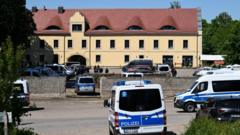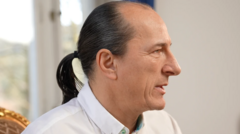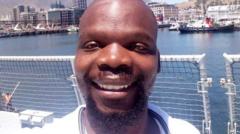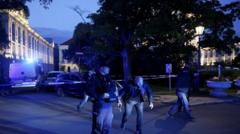In a significant law enforcement action, German police arrested Peter Fitzek, a self-proclaimed "king," along with three other leaders of the extreme-right group known as Reichsbürger, during raids across seven states that involved approximately 800 personnel. The government has officially banned their organization, which seeks to establish a "Kingdom of Germany," due to allegations of attempting to undermine state authority.
Germany Targeting Extremism: Self-Proclaimed 'King' Arrested and Group Banned

Germany Targeting Extremism: Self-Proclaimed 'King' Arrested and Group Banned
German authorities crack down on the extremist group Kingdom of Germany and its self-declared 'king' for allegedly plotting to overthrow the government.
Fitzek, 59, who has styled himself as "Peter the First" after a self-coronation in 2012, has claimed to have a following of thousands and promotes the notion of an alternative state complete with its own currency and governance structures. Government officials, including Germany's interior minister Alexander Dobrindt, asserted that Fitzek's group spreads antisemitic conspiracy theories and challenges the rule of law, financial operations described as "economic criminal structures."
This arrest of Fitzek arises from a history of confrontations with authorities, including repeated infractions of the law like driving without a license — a symbolic rebuke of government authority, he claims. The Reichsbürger movement, comprising around 25,000 members, has grown increasingly concerning to law enforcement as they refuse to recognize state authority and often interact violently with police.
Additionally, in 2022, numerous Reichsbürger members were apprehended for alleged plots to overthrow the German government, which involved extreme violence, highlighting the movement's growing notoriety. Initial perceptions of these individuals as mere eccentrics have evolved, with officials now recognizing the potential for significant threats to public order posed by their activities.
The federal prosecutor's office classified Fitzek and his group as a criminal organization, citing Fitzek's decisive control over the group's operations and reiterating the absurdity of their claims to sovereign status based on outdated imperial definitions, which makes this crackdown an evident priority for the German government and its commitment to maintaining democracy.
This arrest of Fitzek arises from a history of confrontations with authorities, including repeated infractions of the law like driving without a license — a symbolic rebuke of government authority, he claims. The Reichsbürger movement, comprising around 25,000 members, has grown increasingly concerning to law enforcement as they refuse to recognize state authority and often interact violently with police.
Additionally, in 2022, numerous Reichsbürger members were apprehended for alleged plots to overthrow the German government, which involved extreme violence, highlighting the movement's growing notoriety. Initial perceptions of these individuals as mere eccentrics have evolved, with officials now recognizing the potential for significant threats to public order posed by their activities.
The federal prosecutor's office classified Fitzek and his group as a criminal organization, citing Fitzek's decisive control over the group's operations and reiterating the absurdity of their claims to sovereign status based on outdated imperial definitions, which makes this crackdown an evident priority for the German government and its commitment to maintaining democracy.


















